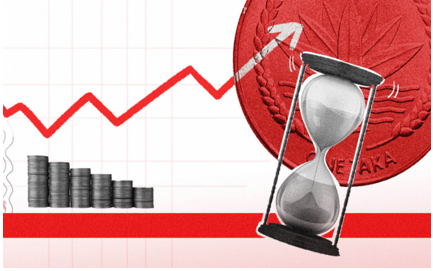INP-WealthPk
Moaaz Manzoor
Experts believe Pakistan's FY2025 budget shows potential for fiscal stability but caution that its achievement will require prudent management of revenue risks and balanced expenditure amid uncertain economic conditions.

Speaking with WealthPK, Ahmad Mobeen, Senior Economist for Asia-Pacific at S&P Global Market Intelligence, noted that the FY2025 budget rests on optimistic assumptions that may not fully pan out, particularly regarding revenue projections. According to Mobeen, historically, Pakistan has struggled to meet its revenue targets, leading to budgetary adjustments where non-essential spending, especially on development projects, is deprioritized to meet fixed obligations like interest payments and defense costs. This trend, he warned, may hinder development initiatives, which are vital for economic growth and infrastructure improvements. Mobeen is also concerned about the indirect taxation approach reflected in the FY2025 budget. He explained that this taxation can prolong inflationary pressures as businesses adjust prices to pass the tax burden on to consumers.
While this may temporarily boost government revenue, it risks diminishing the consumer purchasing power and slowing economic growth. Taxing the wholesale and retail sectors can further strain the services industry, potentially stifling growth in a key area of Pakistan’s GDP and tax revenue base. Adding to the analysis, Dr. Nasir Iqbal, Acting Dean and Head of Macro Policy Lab at the Pakistan Institute of Development Economics (PIDE), described Pakistan's shrinking fiscal deficit as a positive indicator, attributing much of this progress to a slowed economic growth rate, currently estimated around 2%. This sluggish pace has helped curb the deficit and stabilize the current account by limiting imports. Despite this, Dr. Iqbal cautioned that this fiscal stability may not be sustainable, given the budget’s dependency on oil-based revenues. While favorable for the short term, this reliance can backfire if the oil prices become volatile.
With Pakistan under an International Monetary Fund (IMF) program, he noted, the upcoming months will require careful expenditure and subsidy management to meet the IMF mandates. Dr. Iqbal also discussed the potential role of privatization as a revenue-generating mechanism, which, if executed strategically, can bolster fiscal stability. He argued that rationalizing fiscal measures and diversifying revenue sources are critical to maintaining the country’s fiscal health amid these external pressures. As the FY2025 budget rolls out, he expressed cautious optimism that privatization efforts and other revenue measures can offset some economic vulnerabilities. However, success will largely depend on a stable economic climate. Experts agree that while the FY2025 budget presents opportunities for revenue generation and fiscal tightening, it remains susceptible to various risks.
They highlighted the challenges of balancing debt servicing and essential spending with development funding, particularly in a low-growth environment. Pakistan’s budgetary structure, with its reliance on volatile revenue sources and indirect taxation, may sustain inflation while curtailing the purchasing power of consumers, which can ultimately limit the overall economic growth. Hence, the FY2025 budget offers cautious optimism for fiscal consolidation but underscores the need for balanced spending and diversified revenue sources. Experts urge Pakistan to implement sustainable fiscal strategies, focusing on economic resilience over short-term gains to ensure stability in an uncertain economic landscape.
Credit: INP-WealthPk













